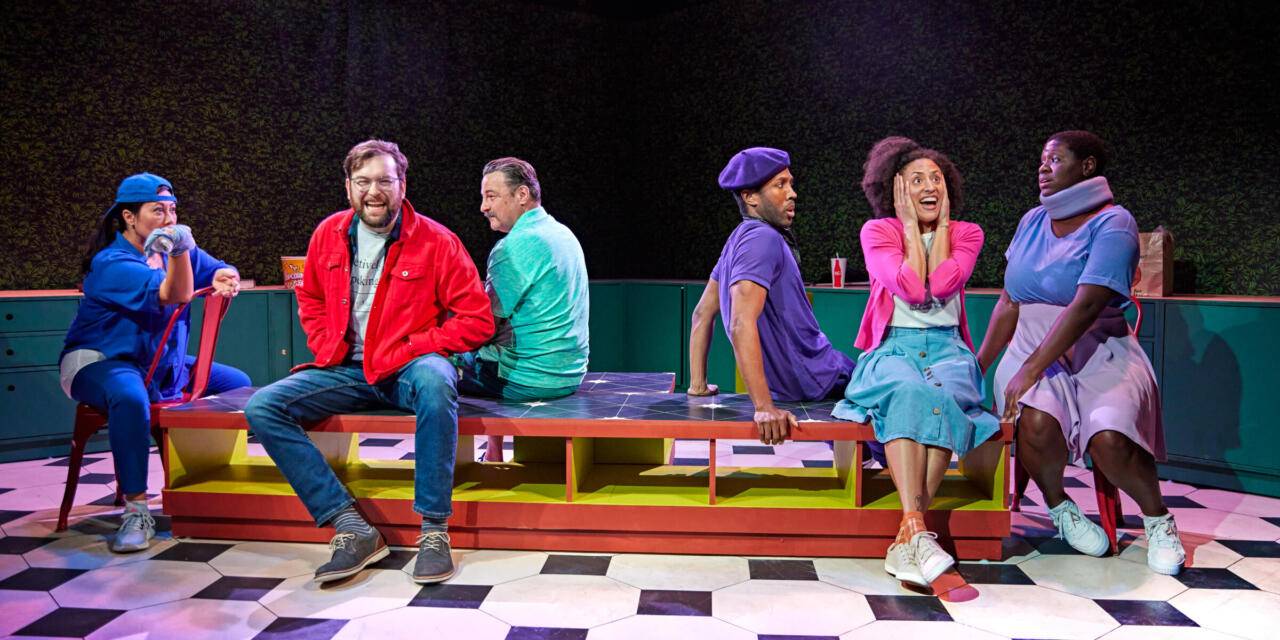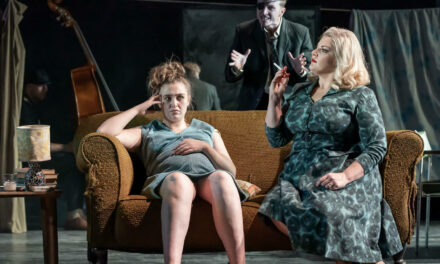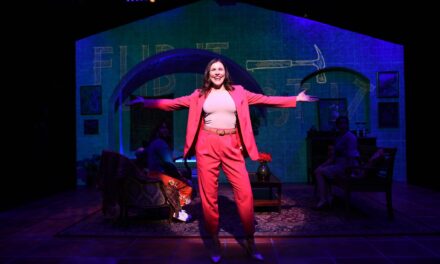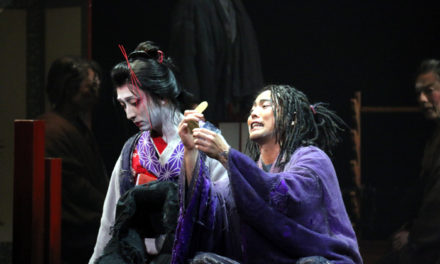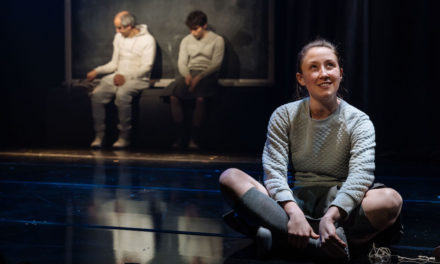I stopped taking notes about halfway through Brittany K. Allen’s Redwood.
I can think of no better way to begin this review than by that admittance. I was so completely absorbed in, entranced by, devastated by the story unfolding in front of my eyes that, with the exception of a few key observations I wanted to recall, I tucked my pencil behind my ear and simply lived with Ensemble Studio Theatre’s impeccable ensemble.
Redwood is, at heart, the story of a family. When Steve Durbin, intellectual and lost, pursues the Durbin family’s genealogical history, he unearths information that sends several family members spiraling. Most affected is his niece, Meg: this sudden revelation of family history entwined with a malicious America forces her to look within her relationship with white physicist Drew. What follows is a story that disarms with comedy to punch one in the gut with truth, and pain, and bittersweet hopes.
The production is a masterclass of intermarriage (no pun intended, considering Meg’s declaration of: “Don’t hate, miscegenate!”). Mikhaela Mahony’s staging, in tandem with Sasha Hutchings’s choreographic design, provides seamless transition between comedy and tragedy, simple and complex, heightened monologue and grounded dynamic. That is due in large part, of course, to Allen’s near-perfect script. Her writing accomplishes something truly difficult: communicating endlessly complex questions of morality and humanity in ways simple to understand in theatrical context. She allows her audience to dig deeper with her characters, never telling how to feel, simply educating and inviting. Redwood provides its audience with the gift of communal discomfort; one is permitted to feel the whole of the human experience, to laugh, to gasp, to receive a knotted stomach and a palpitating heart, within the dichotomous comfort of this play.
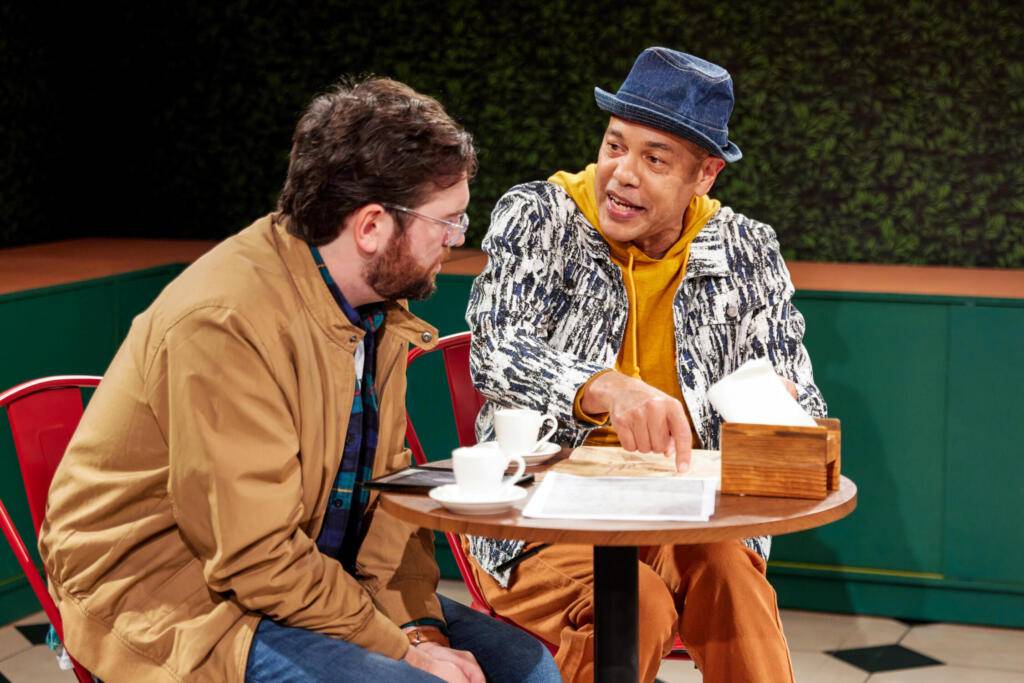
Drew Lewis (L) and Tyrone Mitchell Henderson. PC: Jeremy Daniel.
Dichotomy is a good word for the production, in fact. When Redwood begins, it is with an extremely energetic opening, hip hop class weaving into monologued hilarity and a most relatable conversation between mother and daughter. Archetype is leaned into quite heavily: Tyrone Mitchell Henderson, as Steve, is a rather textbook gay uncle; Drew Lewis, as Meg’s partner Drew, is the nerdy nice-guy; Portia, as Meg’s mom Beverly, is the classic church lady. Heightened delivery is the norm, featuring fourth-wall breaks, dance sequences, and a sing-along to Natasha Bedingfield’s “Unwritten.”
Then, with enviable subtlety, there is a shift. One doesn’t realize it until it’s felt, settling in one’s bones. Redwood turns realism, with a sprinkling of magical. Archetype becomes embodiment; waxing poetic turns vulnerability; shining purple greys into spotlight. Ancestors appear in the background in furthering perpetuity, a fantastic decision in staging perspective. This tonal shift serves Redwood and its cast of characters well: after all, what is being human other than complicated duality? What can we do sometimes other than crack jokes in the middle of horrible feeling? Allen’s writing, Mahony’s direction, and Hutchings’s choreography showcase this to incredible effect.
Frankly, it’s refreshing to see a play engaging in such pragmatic confrontation. There isn’t false hope, or false comfort. There is no true “right way,” as individuals, to go about addressing this country’s racist history, a point several characters make. Each side is humanized without defending their choices; one will find no White Savior, no Angry Black Woman, no Magical Healing here. There is simply truth, whatever that may mean for each character. The fact that they are humanized makes this exploration hit ever harder: the slave owner was a person, not a storybook villain (“He was a person.”); the slave was a person, not a sidebar in a history book (“She was a person”). Humanization brings Redwood’s audience into stark, necessary confrontation.
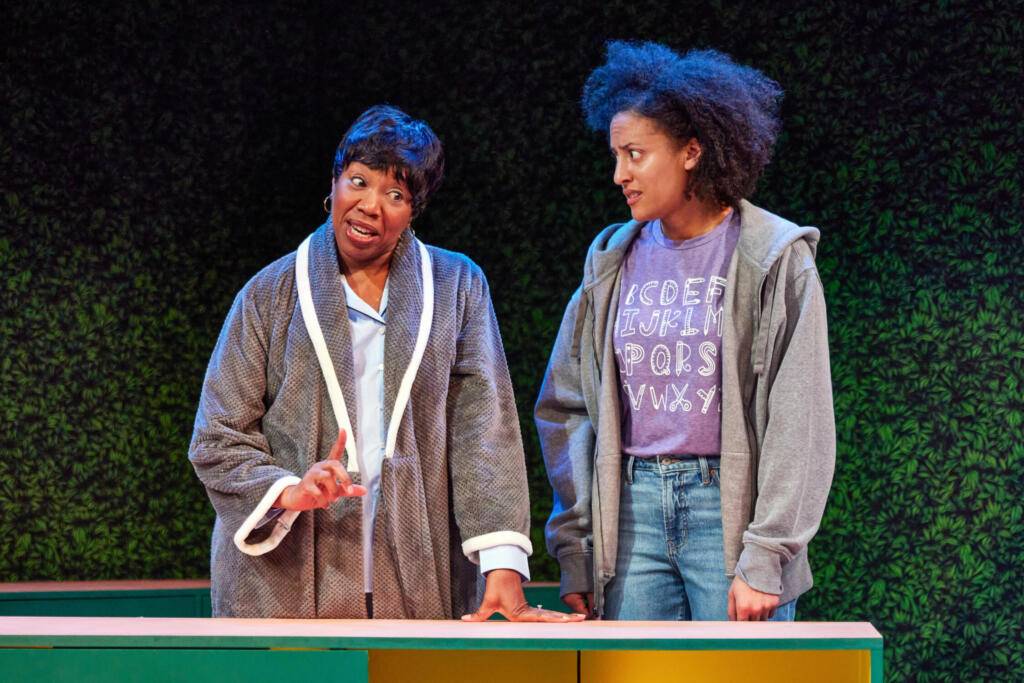
Portia (L) and Brittany K. Allen. PC: Jeremy Daniel.
None of this would have succeeded, of course, without its incredible ensemble cast. Allen, playing her own Meg, is equal parts wide-eyed and wise, regressing and progressing with agility. Lewis plays a man in deep questioning of his family, his identity, struggling to unlearn the internalized stereotype he owns. Henderson’s Steve is a person wrapped under layers of protection, a Black gay man who tries to pretend he’s alright; Henderson’s ability to live within both worlds—that of ache immemorial and that of confidence—is stunning. Portia transforms Meg’s mother from imagined archetype into intelligent, brash, and pained, a combination not simple to play. And the ensemble—comprised of Denny Dale Bess, Bryn Carter, Kate Siahaan-Rig, and Eric R. Williams—shone. Diving between a multitude of characters across time and space, they alternately pull full-throated laughs and yank on the heartstrings of their audience. Truly the cleverest casting.
I would be remiss to not mention, as well, the beautifully-paired creative team: Ao Li’s scenic design, of deceptively simple Americana; Mika Eubans’s costumes, vibrant and communicative; Betsy Chester and Stacey Derosier’s lighting, far more subconscious storytelling than I ever anticipated; Caitlyn Murphy’s props, smart and befitting; and Kathy Ruvuna’s sound design, filled with impactful musical cues. There was not one misstep.
Redwood closes on November 19, and I will be thinking of it for quite some time.
For more information about Redwood, click here.
This post was written by the author in their personal capacity.The opinions expressed in this article are the author’s own and do not reflect the view of The Theatre Times, their staff or collaborators.
This post was written by Rhiannon Ling.
The views expressed here belong to the author and do not necessarily reflect our views and opinions.

